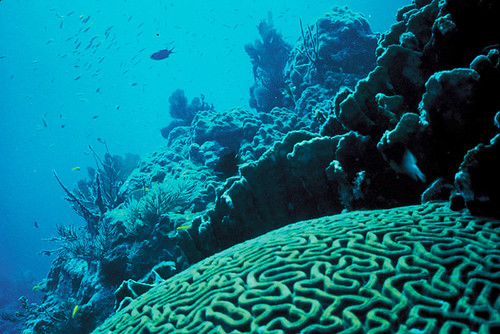 A world-first scientific study has found that the world's coral reefs are being weakened by microscopic borers and will erode more rapidly as the oceans warm and acidify. This phenomenon, combined with a slower growth of coral reefs due to ocean acidification, may make reefs more vulnerable to storms and cyclones, according to Ms Catalina Reyes of the ARC Centre of Excellence for Coral Reef Studies (CoECRS) and The University of Queensland (UQ).
A world-first scientific study has found that the world's coral reefs are being weakened by microscopic borers and will erode more rapidly as the oceans warm and acidify. This phenomenon, combined with a slower growth of coral reefs due to ocean acidification, may make reefs more vulnerable to storms and cyclones, according to Ms Catalina Reyes of the ARC Centre of Excellence for Coral Reef Studies (CoECRS) and The University of Queensland (UQ).“So fish, turtles, sharks, lobsters and other reef organisms may lose their homes, threatening reef biodiversity and the livelihoods of tens of millions of people,” Ms Reyes said. Ms Reyes explained that corals use calcium carbonate, or limestone, to build the reef structure.
As the coral accumulates, carbonate and extend their skeleton, the old, dead parts are eroded by waves, currents, fishes, sponges and by tiny plants that live inside the reef.
“There is a fine balance between accumulating and losing carbonate, and healthy reefs are the ones that gain more than they lose,” Ms Reyes said.
“Anything that disrupts this balance puts coral reefs in danger.”
Coral reefs are already threatened by ocean acidification caused by human carbon emissions dissolving into the oceans. Associate Professor Sophie Dove of CoECRS and UQ said coral reefs were already threatened by ocean acidification caused by human carbon emissions dissolving into the oceans.
This process reduced the amount of carbonate in the seawater, which meant the corals build the reef at a slower pace, she said.CoECRS researchers found that the lack of carbonate to build coral reefs wasn't the only challenge that these ecosystems faced. In this latest study, CoECRS researchers found that the lack of carbonate to build coral reefs isn't the only challenge that these ecosystems face.
“Our research shows that when seawater is both acidic and warm – which is predicted to happen under future climate scenarios – coral reefs could be made more fragile by microborers such as algae, blue-green algae and fungi that inhabit reefs and bore tiny holes in it that undermine the strength of the coral skeleton,” Associate Professor Dove said.
To explore how the combination of a warm and acidic ocean affects the activity of microborers, the researchers exposed different types of coral skeletons in tanks containing seawater, which simulated two future climate scenarios.
Ms Reyes said the first scenario was ‘business as usual' where nothing was done by humanity to decrease CO2 emissions.
“In this case, the rate of erosion by the microborers of the coral skeletons almost doubled compared to the present day,” she said.
“In the second scenario, in which CO2 was above current levels but less than the ‘business as usual' scenario, the rate of erosion was 35 percent.
“We found that microborers were more abundant under both predicted scenarios, so it is possible that acidic and warm sea water will stimulate their growth, leading to coral skeletons dissolving faster."
Ms Reyes said the most abundant type of algae identified in the study was also the world's most common photosynthetic microborer, capturing sunlight to fuel its activities.
It currently inhabits 85 percent of the world's corals and has an extraordinary ability to cope with low light conditions, allowing it to penetrate deep into coral skeletons.
Dr Dove said in the future corals would have less material with which to build their reefs, and the old, dead parts that support them would erode much faster.
“If we think of the reef as a scaffold, it's now being taken apart faster than it can re-build, which means that it's at a higher risk of collapsing,” she said.
“Even if there are ‘super corals' that do well in an acidic ocean, this study shows that we mustn't underestimate how much climate change can affect other important reef processes.”
The study Ocean acidification and warming scenarios increase microbioerosion of coral skeletons by Catalina Reyes-Nivia, Guillermo Diaz-Pulido, David Kline, Ove-Hoegh-Guldbeg and Sophie Dove has been published in the latest issue of Global Change Biology. View the publication here
For more information visit http://www.coralcoe.org.au/
Source: University of Queensland
Image courtesy of eutrophication&hypoxia via Flickr (CC BY 2.0)
